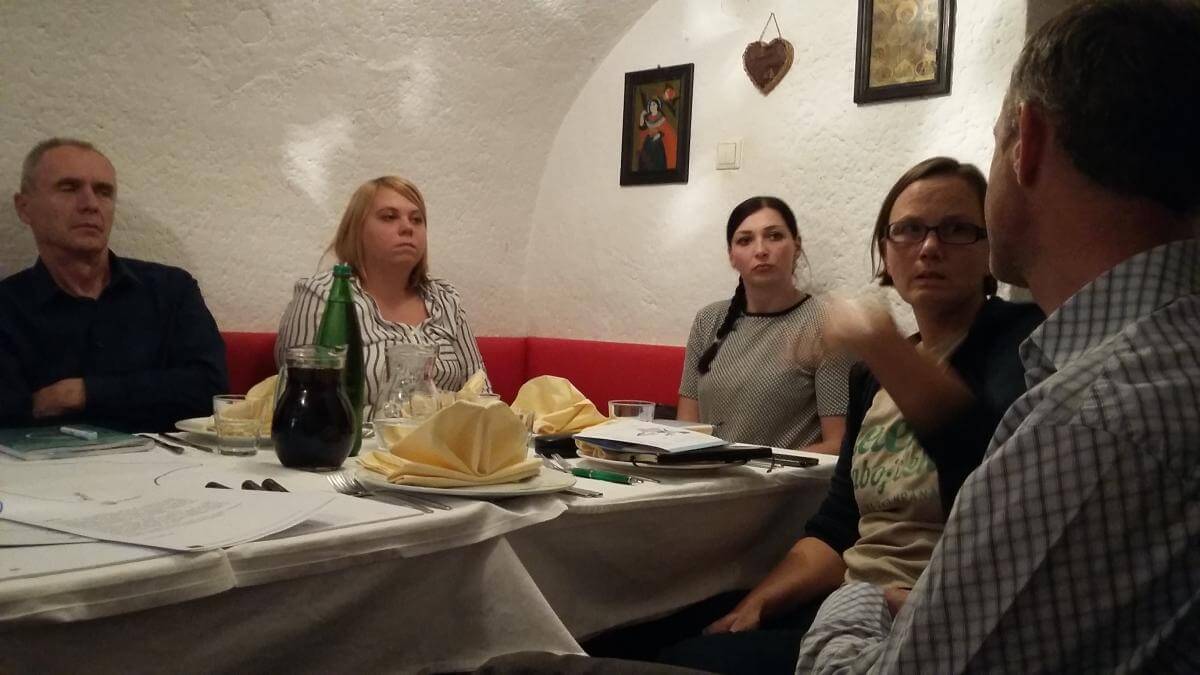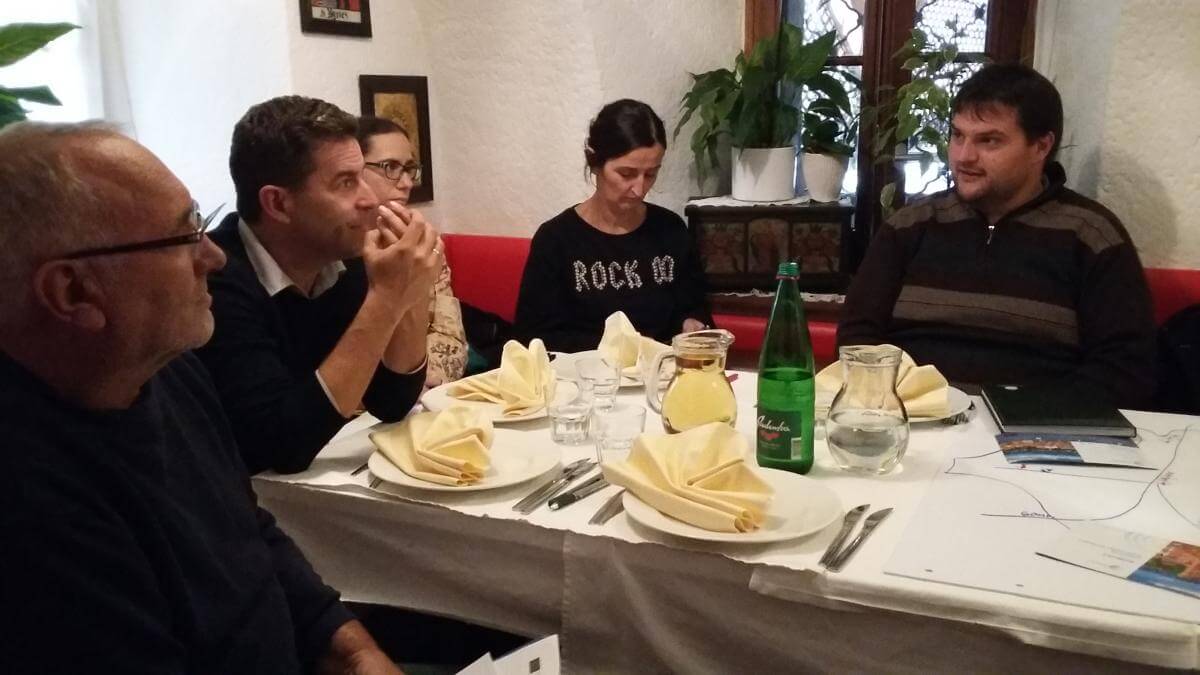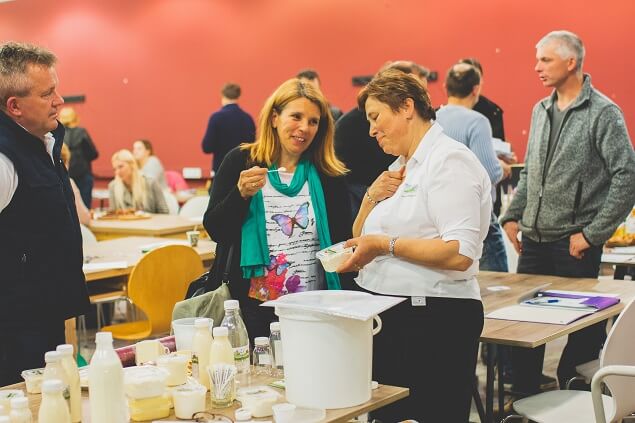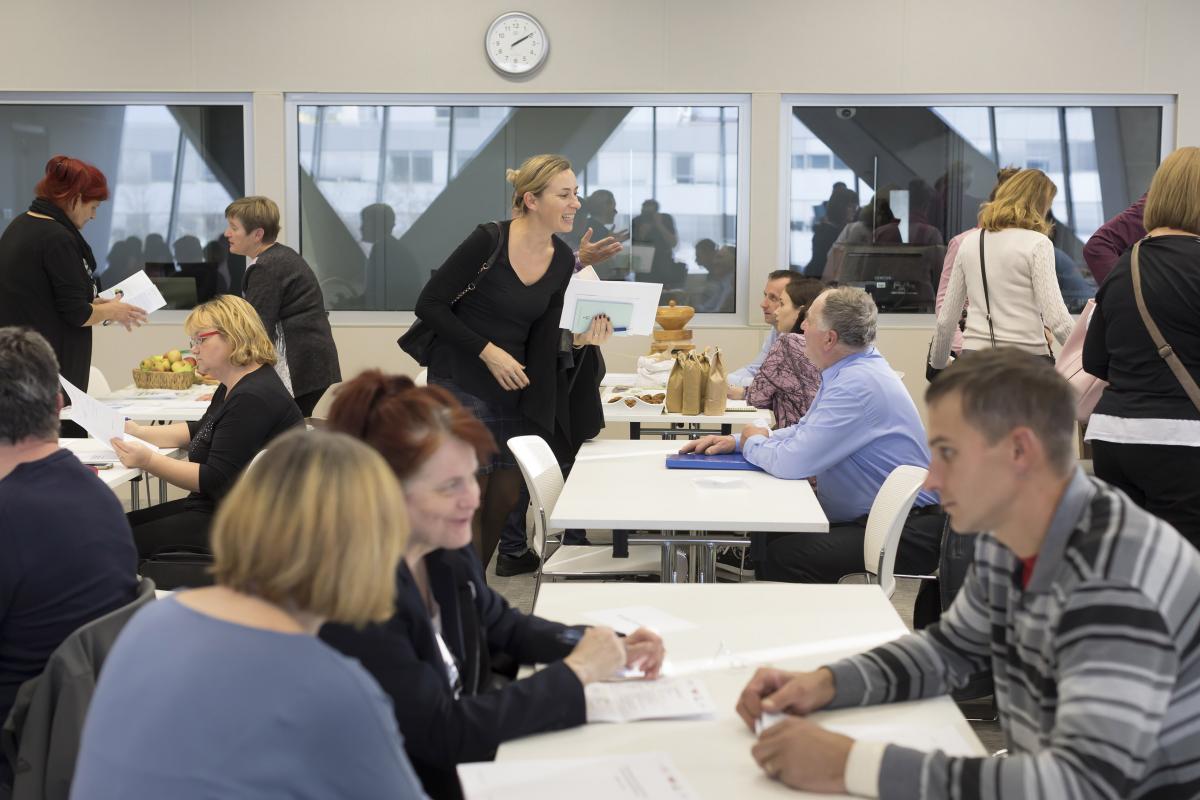Ljubljana
Live Cases
Live Cases are a real-time journaling process for the Living Lab case studies. Follow along quarterly to learn more about the experiences and lessons learned taking place in the ROBUST Living Labs.
Live Case 5: Diving Deeper into Local Public Procurement
Ljubljana Living Lab is largely focused on issues of sustainable food production, particularly on short supply chains and interactions between local producers and urban consumers. The main innovation that the Living Lab planned to pursue were new data collection methods from producers and users to develop real-time information to co-develop products that meet consumers’ needs.
The Living Lab decided to focus on school and kindergarten meals, which use a public procurement mechanism to source food and have limited flexibility in terms of quality vs. price selection criteria. Data on using public procurement for sourcing local food were collected and detailed information on locally sourced food was collected and analysed from a pilot school for 2018 and 2019. The analysis showed that schools like to establish long-term cooperation with farmers who are reliable, flexible, and have good quality products, regardless of how close to the school they are located. This raised the question on how to define “local” in this context.
The public procurement system is complicated and requires effort on both sides. We found that farmers currently have no time and/or interest to venture into additional activities for exchange of information, data collection and similar. Initially, the Living Lab also planned to investigate food waste reduction in kindergartens and schools. However, as the topic of local food provision in the school system turned out to be so broad and as schools are already successfully dealing with this issue, this topic was not researched further.
The second innovation that the Living Lab planned to pursue were new forms to measure the impact of different approaches to food supply chains, and it was researched in the frame of public procurement in schools. The focus was on the potential to assess environmental impacts and social implications, including using the local food concept in classrooms (e.g. topics of nutrition, agriculture and local environment in the national curricula).
The local farms have the potential for school visits or for becoming teaching farms, but contrary to other regions, this has been used only ad hoc in the Ljubljana Urban Region. It would be interesting to research nutritional and health aspect of food in schools (locally procured vs. globally sourced), however this would require setting up longer period observation in several pilot schools for which the Living Lab could not find enough interest.
The third innovation that the Living Lab planned to tackle was improved cooperation of municipalities and their public institutions in the research platform with new design forms of in terms of co-innovation, co-design and similar. Again, the Living Lab decided to focus on public food procurement for kindergartens and schools. It turned out that the Municipality of Ljubljana provides support by organizing joint procurement, providing administrative support, and facilitating exchange of information, while other municipalities are less interested in this topic.
Live Case 4: New Research Pathways In "Coronatime"
In the beginning of 2020, life in the Ljubljana Urban Region continued with the usual pace, following the news from neigbouring Italy with both interest and oblivion. In late February, during the traditional holiday season when many people go skiing in Italy and Austria, the first cases of Covid-19 infections appeared. As infection numbers increased, the Slovene government took the first measures to limit the number of participants at public events, eventually closing schools on 13 March, and declaring lockdown on 16 March.
All segments of society and economy adjusted quickly to the measures for curbing the spread of Covid-19. Schools quickly organized online classes and public institutions and service businesses shifted to work from home. ROBUST partners, the Regional Development Agency of Ljubljana Urban Region and Oikos, were among them.
Towards the end of the lockdown, the Regional Development Agency used the situation to make minor office renovations and reorganizations. Manufacturing has adjusted by increasing the physical distance between the workplaces and/or splitting the workers into newly introduced shifts. Often the demand and thus production dwindled and at least part of the workforce was held on standby at home. The government-support package provided almost EUR 1 billion worth of various measures, including financial compensation for workers on stand-by, postponed tax payments and vouchers for tourist facilities for all citizens. Some sectors, such as tourism, international logistics, sports and art have been struck particularly hard, resulting in increased unemployment in the sector.
The Ljubljana Living Lab’s previous regional workshop showed the locally produced food supply is limited by technical difficulties and lack of skills and that many regional farmers are content with their own consumer network, fearing the risk of bolder initiatives. The Covid-19 pandemic disrupted the food supply chains and, although there were no food shortages in the shops, direct purchases from local farms greatly increased. As a result, the farmers were pushed to adjust, improve their skills and take on the risks of new endeavours. Numerous farms improved direct on-site sales, introduced “pick-it-yourself” systems, and started to offer direct delivery themselves. Moreover, new businesses pooling the products from different farms for door-to-door delivery sprang up.
Similar trends were observed in other sectors: non-essential shops and restaurants quickly pivoted to online shopping and food orders. This created an employment shift; logistics and warehouse management has soared to accommodate the increased demand of direct deliveries to households. No data are available, but businesses in the Ljubljana Urban Region might have been faster at switching to online services, as there were already successful models for online local delivery businesses.
The lockdown was eased in late May, however many services and manufacturing did not return to the previous way of operating and it is unlikely that they ever will. Many businesses, particularly the SMEs, have closed or may not survive in the long term, and the self-employed are still struggling and trying to pivot their activities. The pandemic restrictions and preventive measures negatively affected the collaborative work of the Ljubljana Urban Region Living Lab.
Luckily, none of the Living Lab members got infected or ill, however everyone had to adjust to changed circumstances. Meetings between the Living Lab members, as well as the regional workshop planned for April, were cancelled. However, the Living Lab members’ preparation for active participation at the cancelled 8th Informed Cities Forum in Lucca was not in vain. It was used for additional information exchange, brainstorming ideas on further development of a sustainable food supply, and research on rural-urban interaction in the food supply chain.
The Living Lab members involved in farming and local produce delivery scaled up both their activities and their geographical range. This required improved logistics oversight and upgraded communication channels, such as organizing quick phone call response in a call-center style, using social media, and using simple software to streamline orders, payments and feedback.
Other Living Lab members whose businesses stalled, took the opportunity to research their markets and prepare new marketing plans, using new information channels and social media. As a result, the Living Lab research has pivoted to a new topic: direct-to-consumer local produce delivery and the related market barriers, skills and success factors.
The absence of face-to-face contact needed some adjustment. Initially, it resulted in more focused work and communication. On the other hand, indirect contact led to less structured planning as it seemed that everyone is available most of the time. Moreover, it is more difficult to schedule extensive online meetings and there are more last-minute schedule changes. As a result, the online meetings tend to be smaller, between two or three Living Lab members. It is interesting that during the strictest lockdown, the Living Lab members felt the need for just a chat, thus some time was dedicated to unstructured small-talk about “life in Coronatime”. This shows that regardless of the situation and limitations, interactions were necessary to keep the motivation and positive feelings.
Live Case 3: Focusing on Sustainable Food Synergies
The Ljubljana Urban Region Living Lab regional workshop took place on 10 October 2019 in Trzin and was organized like a talk club. Follow-up interviews on the same topics were conducted with interested individuals who had other commitments and could not attend the workshop in person. The workshop participants were mostly from the agricultural sector, including researchers. One of the largest Local Action Groups also participated and a young entrepreneur provided insights on entrepreneurship related to cultural heritage.
The regional workshop was organised to explore and discuss the nature and characteristics of cross-sectoral interactions between stakeholders within and across the the thematic fields prioritized in the Living Lab (sustainable food systems, new business models and labour markets, and public infrastructure and social services). The main topic of discussion was sustainable food systems, however other thematic fields were discussed as well in this context.

One of the main lessons learned from the workshop is that while public procurement of locally produced food in public institutions is strongly supported, it is marred by administrative burden and there is no evidence of its impact.
No analysis has been made yet of the supply chains, their effectiveness and their actual impact on local farming and rural development in general. The public procurement process is a repetitive administrative burden both for the the public institutions and farmers who weigh between undergoing small income losses and a tedious preparation process for the required documentation with high failure risk.
It was observed that increasingly the bidders are commercial entities who might succeed due to pooling the produce from large number of farmers or repackaging imported produce. As a result, it was agreed that mapping the supply chains in public procurement in schools will be the focus of further research of Ljubljana LL in ROBUST project.

Another lesson learned is that the supply of locally produced food is limited by technical difficulties and lack of skills. There is high appreciation for local produce in the region and consumers are willing to pay higher price at least for some products. The production costs are high because of the small size of farms and natural characteristics (Less Favoured Areas), but also due to weak business models and fragmented logistics.
Many farmers are content with their own network of small-scale buyers as they fear the demand oscillations and cannot handle the risk management of bolder initiatives. These would require improved capacity for handling and storing the produce, improved and enlarged storage capacities, more attention to standardization, and improved logistics.
Nevertheless, ambitious farmers and farmers’ associations are spearheading initiatives to establish joint storage capacities and joint produce marketing, which would simplify purchasing and logistics.
Local identity is strong and it appears that often the municipalities and/or LAGs provide the initiative and infrastructure for some traditional or locally specific activities that can then develop into new business initiatives. Although small-scale, they can create jobs based on individual entrepreneurship and can increase motivation and awareness of the opportunities. The example of the Straw Hat Museum in Domžale and newly established boutique production of straw hats is an example of local craftsmanship as cultural heritage that evolved into niche business marketed through social media, tourist information and participation at various events.
Live Case 2: Short Food Supply Chain Speed Dating
The Living Lab of Ljubljana Urban Region is focusing on establishing a functional collaborative partnership/platform to co-design and operate short food supply chains in Ljubljana’s rural-urban relations.
We would like to identify the success factors that enable shortening the food supply chain. In the context of the characteristics and trends in the region, factors such as purchasing power, consumers’ needs, supply capacity of local producers, impact of local chains on the environment, social inclusion and internationalisations are just some of the ones to be considered.
The Living Lab performed a mapping exercise in order to identify various stakeholders, particularly the key “players” in the food supply chains in the region. These included producers focused on the local market, local producers’ initiatives/groups, LAGs, public institutions, restaurants, specialized shops and similar. The mapping built on the work of Municipality of Ljubljana on public procurement of locally produced food and expanded it to the whole region and beyond just public procurement.
As a result, a database was set up, which will be expanded throughout the project when also new tools for data collection will be used. The role and interest of the stakeholders were identified and this will be followed by focus groups and interviews with a range of types of the stakeholders. Such approach will enable us to verify the findings and create an internal partnership among stakeholders.
The interest and potential for participating in public food procurement was noted and factors that influence this will be researched in the following stages, including the legal requirements for procurement procedures that might inhibit publicly procuring local food. Past work is already yielding some results.
On 21 May 2019, the third marketplace meeting will be organized. It is an event for pairing local food producers and consumers together that is a mixture of a stock exchange and quick pairing meetings (business “speed dating”). The previous two events took place in 2018 and attracted a number of producers and mainly public institutions. The event is organized in cooperation with the Municipality of Ljubljana, Tourist Office Ljubljana, Chamber of Agriculture and Forestry and EKOmeter. The interest and number of participants is growing and we plan to attract more businesses, too.

Photo by Urša Peršič , RRA LUR
Live Case 1: Shortening the Food Supply Chain in the Ljubljana URA
Living Lab Ljubljana urban region partners have a history of collaboration. Public institutions, restaurants and smaller food producers have been trying to meet their interests and to collect data on food demand in public institutions and on food supply in the region for past two years. This cooperation started in the capital city of Ljubljana, but the intention of the Living Lab is to widen this cooperation throughout the whole region of half a million inhabitants.
Research and other preparatory work in the Living Lab will be therefore focused on collecting additional data on the food demand and potential supply over the territory of the whole region. In parallel we will run co-design processes to build internal partnerships among stakeholders. With their help, we will look into legal requirements on procurement procedures concerning the local food supply chains with the goal to increase the use of locally-produced food in public institutions. In order to show differences between the traditional approach to food purchase in public institutions and the localized one, we will evaluate the impact to the economy, environment and social inclusion.
Several activities have already been implemented in the region within the context of the ROBUST project. As an experiment, we started to organise events for pairing local food producers and consumers (mainly public institutions). Two of these events took place in 2018, in the spring and in the autumn. The participants welcomed the idea of pairing and have expressed enthusiasm over doing it regularly.

Photo credit: Aleš Rosa
As the research and cooperation in this field is rather new in Slovenia and there are no examples of larger scale (regional or national) to local food chains, the Living Lab will also engage other stakeholders – from the national and regional policy level to the municipalities – to help identify potential partners in the process.
To close the information gap we are facing about short food supply chains, the Living Lab will test different methods of data collection and sharing using are variety of participatory methods (e.g., participatory GIS mapping, co-design of processes and products, co-design school diet). This will help build the community around the local food chain and improve the value for all participants.
Challenges to a Regional Approach
This process makes the Living Lab process experimental and a catalyst for the future food chains in the region, but the (lack of a) regional governance structure may be one of the obstacles in the process. The regions in Slovenia have no governance structures at this scale and a lot of work will need to be invested in cooperation with municipalities and stakeholders to gain project and policy support. The goal of the Living Lab is to adopt the idea of supporting short food supply chains by all the partners in the Ljubljana urban region.